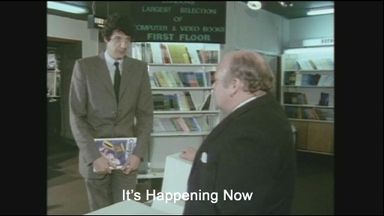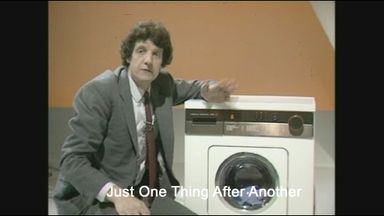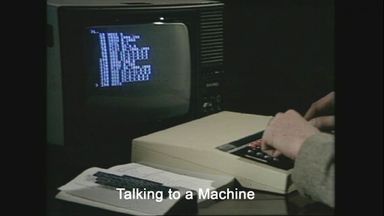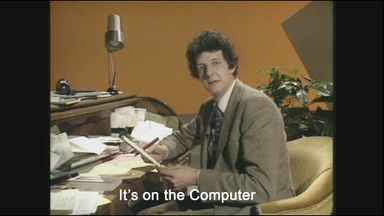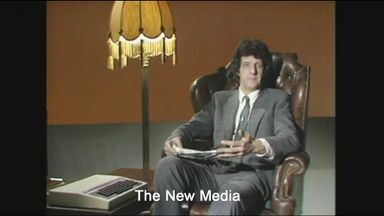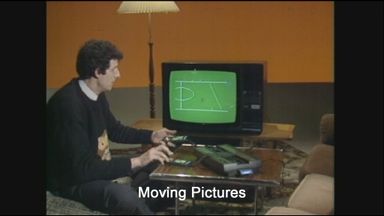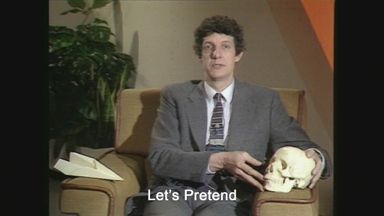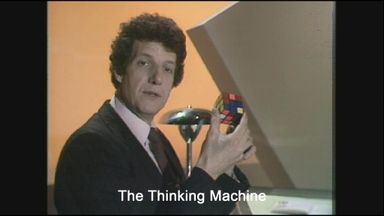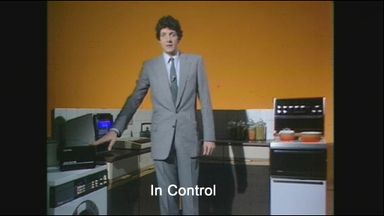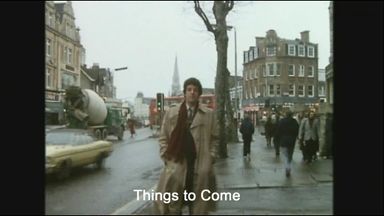The Computer Programme
7. Let's Pretend
Clips from this programme
A top end example of computer simulation modelling an aircraft's movements - a Rediffusion Boeing 727 flight simulator
Duration: 02:51Chess moves in many ways model social structures and power in society itself.
Duration: 01:55The value of modelling. A simulated moon landing gives a partial experience of a flight simulator
Duration: 01:12An animated bouncing ball program on a microcomputer and models of molecular structures show the value of even quite simple modelling for understanding and exploring the real world.
Duration: 01:25Financial modelling in a business. Mac shows how a simple spreadsheet could help a businessman to work out how to reduce an overdraft to zero
Duration: 01:48Gill Nevill investigates how computer modelling can help accident investigators use a home micro programme work out the dynamics of a collision in order to assess blame in a fatal accident - the dynamics of the real accident are analysed.
Duration: 04:13Mac shows a simple program to calculate and then graphically simulate the water leakage in a pond full of carp.
Duration: 04:23Forecasting the 10 day weather forecast for Europe requires 530 billion calculations a day on a huge model with very many complex variables. A Cray supercomputer in Shinfield does its best and succeeds overall but can't predict the weather accurately in Romford
Duration: 02:13Simulating the stresses on a civil engineering structure - in this case the Humber Bridge - allows 'what if' calculations which can test designs for potential flaws. Flaws that led to the Tay Bridge and Tacoma Narrows Bridge disasters.
Duration: 02:22The Computer Programme
1. It's Happening Now
First broadcast: 11th January 1982
Duration 24:51
"Don't expect the computer revolution to happen tomorrow, it's going on all around us." Chris Serle, Ian McNaught-Davis and Gill Nevill begin their exploration of the world of Information Science and ask: 'What can computers do for us? Who is using them now, and where is this technology likely to lead?' Director: FRANK ASH Director: MATT BONEY Producer: PAUL KRIWACZEK
2. Just One Thing After Another
First broadcast: 18th January 1982
Duration 24:53
CHRIS SERLE, IAN MCNAUGHT-DAVIS and Gill Nevill, continue their exploration of the world of information science. Even the most elaborate and sophisticated computer programs are made up of only a few types of relatively simple steps. The art of computer programming lies in combining these into ever more complex combinations. Directors FRANK ASH, MATT BONEY Producer PAUL KRIWACZEK
3. Talking to a Machine
First broadcast: 25th January 1982
Duration 24:23
CHRIS SERLE, IAN MCNAUGHT-DAVIS and GILL NEVILL continue their exploration of the world of information science. The difficulty of communicating with computers is that they are machines and we are people. The common language we share can turn out to be a lot more like English than we might expect. Directors FRANK ASH, MATT BONEY Producer PAUL KRIWACZEK
4. It's on the Computer
First broadcast: 1st February 1982
Duration 24:39
CHRIS SERLE, IAN MCNAUGHT-DAVIS and GILL NEVILL continue their exploration of the world of information science. Storing information is what the great majority of computers are used for. But how much can they hold, and how can the stored information be easily retrieved? Director MATT BONEY Producer PAUL KRIWACZEK
5. The New Media
First broadcast: 8th February 1982
Duration 24:12
CHRIS SERLE, IAN MCNAUGHT-DAVIS and GILL NEVILL continue their exploration of the world of Information Science. 5: The New Media : The greatest public impact of information technology is likely to be in the provision of new means of communication. Directors FRANK ASH, MATT BONET Producer PAUL KRIWACZEK
6. Moving Pictures
First broadcast: 15th February 1982
Duration 24:37
CHRIS SERLE, IAN MCNAUGHT-DAVIS and GILL NEVILL continue their exploration of the world of information science. For many people games, with their elaborate visual displays, are the most commonly encountered aspect of computer technology. But generating sound and pictures from a computer is no different to manipulating text. Director: MATT BONEY Director: Frank Ash Producer: PAUL KRIWACZEK
7. Let's Pretend
First broadcast: 22nd February 1982
Duration 24:32
CHRIS SERLE, IAN MCNAUGHT-DAVIS and GILL NEVILL continue their exploration of the world of information science. 7: Let's Pretend: Training space-shuttle pilots, or testing bridges to destruction, is normally too costly or too dangerous to do on the real thing. But by giving a computer an exact description of how a complicated system behaves, it can mimic anything from the British economy to the world's weather. Directors FRANK ASH, MATT BONEY Producer PAUL KRIWACZEK
Now playing
8. The Thinking Machine
First broadcast: 1st March 1982
Duration 24:30
CHRIS SERLE, IAN MCNAUGHT-DAVIS and GILL NEVILL continue their exploration of the world of information science 8: The Thinking Machine: In spite of years of investment in the development of intelligent machines, computer scientists are still a long way from equalling human thought, let alone surpassing it. The future, however, may yet present us with great surprises. Directors MATT BONEY, FRANK ASH Producer PAUL KRIWACZEK
9. In Control
First broadcast: 8th March 1982
Duration 24:34
CHRIS SERLE, IAN MCNAUGHT-DAVIS, GILL NEVILL 9: In Control: By far the greatest number of computers with which we will come into contact in the future will be invisible. They will be the microprocessors built into many of our domestic appliances, replacing many of the mechanical systems that we use today, with greatly improved reliability, flexibility, and at low cost. Directors FRANK ASH, MATT BONEY Producer PAUL KRIWACZEK
10. Things to Come
First broadcast: 15th March 1982
Duration 24:17
CHRIS SERLE, IAN MCNAUGHT-DAVIS and GILL NEVILL continue their exploration of the world of information science. Things to Come: Information technology has the power to change the face of our society completely by taking over the work of a large majority of the population. But will this be allowed to happen, and which aspects of our economic life are most likely to be affected? Directors MATT BONEY, FRANK ASH Producer PAUL KRIWACZEK












